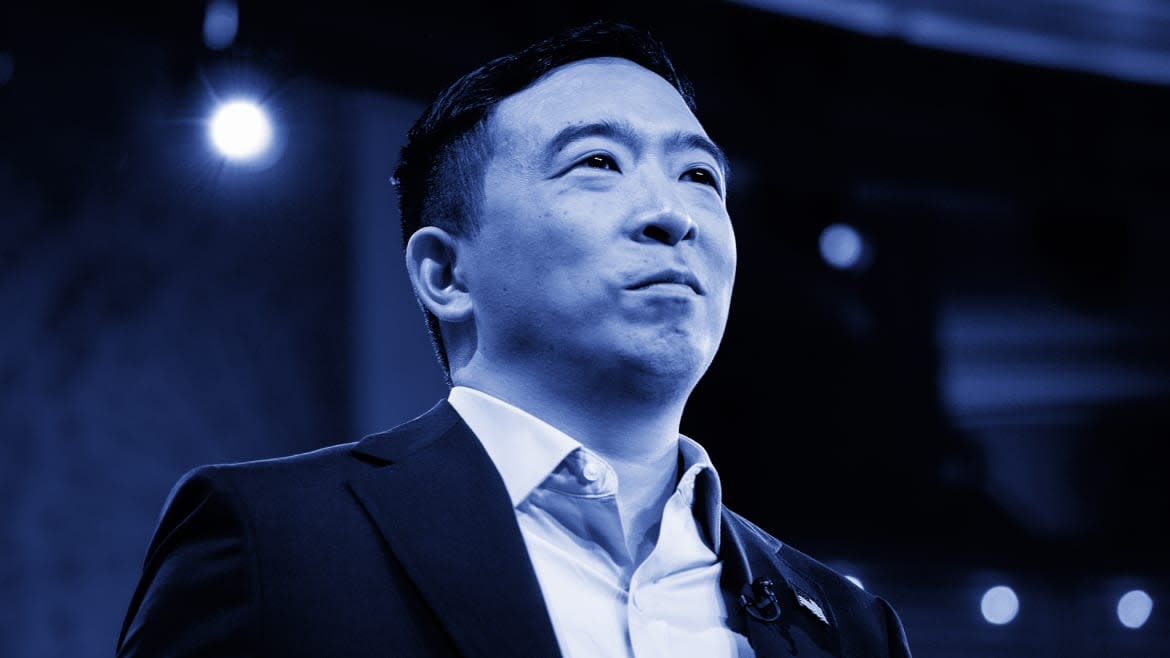Andrew Yang’s Dumb Gimmick Stepped on His Own Important Message

Andrew Yang has been my favorite Democrat to watch this election cycle, partly because he’s the candidate I would most like to be friends with. That’s why I was so disappointed to see him resort to a cheap stunt during last week’s debate.
I assumed that having earned his way into the first debate where all the candidates would share the same stage at the same time, Yang would seize this moment to explain the core issue that has propelled his candidacy.
In case you missed it (and you wouldn’t have seen it during the debate!), Yang’s fundamental message is that a lot of working-class Americans have been left behind, and the culprit is automation. This problem, Yang insists, is going to get much more pervasive. Like the Industrial Revolution, it will lead to tremendous dislocation and disruption.
To manage this inevitable transformation, Yang proposes a universal basic income (UBI) of $1,000 a month, an amount specifically chosen to be big enough to mitigate the harm without being so big as to disincentivize work. Indeed, Yang argues that his “freedom dividend” could actually liberate us to pursue our inventions, passions, and dreams. The brilliance here is that Yang frames what might otherwise be seen as a radical progressive idea in language that sounds good to conservative ears.
Democrats, Beware of Andrew Yang’s Insane Vision for America
But instead of telling this (admittedly longer) story, Yang chose to turn his opening debate statement into a raffle where 10 families will win a “freedom dividend” of $1,000 a month for a year.
By turning his big idea into a sort of game, Yang doesn’t just skip over the seriousness of a looming automation dystopia—he actually trivializes it. What is more, the idea of giving away money based on luck or need (it’s not actually clear how winners will be determined) actually steps on Yang’s own messaging. That’s because Yang carefully avoids framing UBI as a giveaway (indeed, to qualify for the check, you’d have to opt out of welfare payments). Instead, he sells it as something you’ve earned—like Social Security—by virtue of being a “citizen of the richest, most advanced country in the world.”
So why would an obviously smart entrepreneur squander the best chance he might ever have to make his substantive argument to a large TV audience? According to Politico, the idea helped Yang “raise $1 million in the 72 hours since the debate and collect more than 450,000 email addresses from people who entered the online raffle…”
Once you view the idea through the prism of list acquisition, rather than traditional message delivery, you begin to see the method to the madness.
This, of course, raises legal questions. FEC experts seem to see this as problematic and dubious, though there is a general sense that nothing will be done to stop it. We live in a world where a foreign government providing opposition research to a candidate doesn’t necessarily qualify as “a thing of value,” and where using campaign funds to ostensibly pay voters can be seen as mere campaign advertising.
It also raises a practical question: Where does this end?
In recent years, we have seen the proliferation of cloying candidates begging us to “visit my website” or to text such-and-such message to such-and-such number. As far as I can tell, though, this is the first time audiences have been invited to participate by virtue of being given the chance to win cash.
And since it has apparently worked, I’m worried that everyone else will get in on the act. That means we can expect to see more elites exploiting their positions of influence and undermining their credibility—all in the service of shameless self-promotion.
I, for one, have had enough of that.
Want to win a copy of my latest eBook? Sign up for my email newsletter at www.mattklewis.com. Terms and conditions may apply!
Get our top stories in your inbox every day. Sign up now!
Daily Beast Membership: Beast Inside goes deeper on the stories that matter to you. Learn more.

